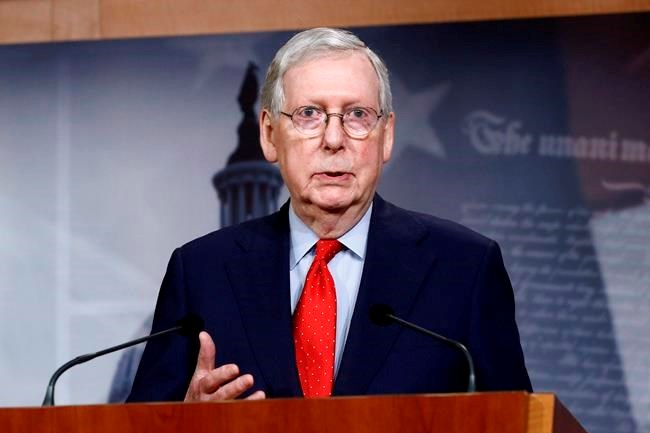WASHINGTON — House Speaker Nancy Pelosi pressed ahead Tuesday with the next coronavirus aid, a sweeping package that is expected to be unveiled soon even as the House stays closed while the Senate reopens in the pandemic.
Key to any plan to reopen the economy, Democrats say, is robust testing. They are also expected to propose another round of direct cash aid for anxious Americans, funds for states to prevent layoffs and more money to shore up businesses in the stay-home economy. The amount of funding has yet to be determined.
“We still don’t have a national testing strategy that is adequate,” Senate Democratic leader Chuck Schumer said. “It’s life and death.”
The contours of the next package are taking shape despite Republican resistance to more spending and a deepening debate over how best to confront the deadly pandemic and its economic devastation.
Senate Majority Leader Mitch McConnell said Tuesday it's time to push “pause” on more aid.
President Donald Trump is encouraging states to reopen and Republicans hope the gradual comeback will kick-start the economy, reducing the pressure for more pricey aid.
“Now it’s time to go back to work,” Trump said at the White House.
Under strict social distancing guidelines, the Senate reconvened Monday for the first time since March, while the House is staying away due to the health risks. The Washington area remains a virus hot spot under stay-home rules.
McConnell has focused the chamber's workload on confirming Trump's nominees, with several committees meeting remotely this week.
The GOP leader insists that any new aid package must include liability protections for the hospitals, health care providers and businesses that are operating and reopening in the pandemic. He said Tuesday he wants to prevent “an epidemic of lawsuits.”
But McConnell also
By reconvening, Senate Republicans are trying to set the terms of debate, frustrated that Pelosi was able to fill up earlier aid bills with Democratic priorities. They’re reluctant to unleash federal funds beyond the nearly $3 trillion Congress already approved in virus relief and hope Trump's push to re-open will reduce the need for more aid.
“I just don’t think we need to act as quite urgently as we did last time,” Sen. John Cornyn, R-Texas told reporters at the Capitol.
The No. 2 Republican, Sen. John Thune of South Dakota, said Washington had already “flooded the zone” with virus relief and should assess “what’s working and what’s not.”
Senators returned to a changed place with new guidelines, including the recommendation that senators wear masks, though not all of them were complying.
Sen. Rand Paul, R-Ky., who tested positive for the virus in March, asserted he no longer needs to cover his face because he has “immunity” — even though health officials warn there is no guarantee that infected people can't contract the virus again.
It’s not just lawmakers and the Capitol's workers at risk.
Sen. Lamar Alexander, R-Tenn., said he disagreed with McConnell's decision to decline Trump's offer of instant virus testing, warning that lawmakers should be screened on exit.
"Members of Congress would represent sort of a virus-spreading machine, coming in here to a coronavirus hot spot and then going home,” Alexander said.
Senators were encouraged to keep their distance and leave most staff at home, though Republican senators gathered as a large group for their traditional luncheon. Public access to the Capitol is limited, including at public hearings. The Capitol itself remains closed to visitors and tours.
In a first, the Banking Committee convened with most of the Democratic senators appearing remotely for a hearing to consider two nominations, including Brian Miller to be the inspector general of the pandemic recovery.
“We’re making a little bit of history here,” said Sen. Mike Crapo, R-Idaho, the chairman.
With Democrats eyeing a new aid package, Pelosi outlined the governors' requests for $500 billion, with the counties and cities seeking as much as $300 billion, which she has said could be spread out over the next several years.
Trump said any new package must have a payroll-tax holiday.
But Republicans are divided on that approach, with some questioning whether it helps the 30 million jobless Americans.
“I’ve never thought that really would be very effective,” Sen. Susan Collins, R-Maine.
Collins is part of a bipartisan group of House and Senate lawmakers, including Democratic Sen. Joe Manchin of West Virginia, who met to discuss a state and local aid package.
The White House, however, is also hitting pause on new aid.
White House Legislative Affairs Director Eric Ueland said before the administration commits to new spending, “the president and his team would like to assess how successful we’ve been as these resources have gone out the door.”
In the Senate, McConnell has loaded up the schedule with consideration of Trump's nominees, including a hearing Tuesday on John Ratcliffe, the Texas Republican congressman who is Trump’s choice to lead the Office of the Director of National Intelligence.
___
Associated Press writers Andrew Taylor, Mary Clare Jalonick, Kevin Freking and Laurie Kellman contributed to this report.
___
This story has been corrected by deleting a reference to $800 billion in funding in the next relief bill; the amount of funding has yet to be determined.
Lisa Mascaro, The Associated Press




